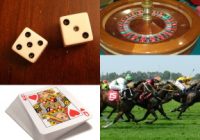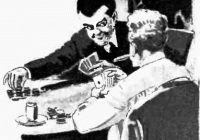|
Listen to this blog post here
Getting your Trinity Audio player ready...
|

1910
Nevada was to cease all gambling operations and activity by midnight September 30, 1910* per a new law, already passed.** The final night, a Friday, was unlike any other before.
“Nevada is determined to be good, even if the last remnant of the old west, in which the Brooklyn and Westchester school of fiction writers find rich color, has to go,” according to a Reno news story appearing in the Seymour Daily Republican (June 27, 1910).
Strange Ambiance
The air was electric on Commercial Row, the center of activity in Reno, the state’s largest metropolis at the time, but heightened emotions were palpable. Many residents and visitors lamented the impending end of an era and future chances to win big. Apprehension, even fear, gripped those who made their living in the industry. A piece of black crepe wrapped around the roulette wheel’s nickel and spindle represented the dealers’ grief. Among those opposed to gambling, a sense of triumph dominated.
People Everywhere
The sidewalks were awash with people, adults and children, residents and visitors, honest and dishonest, many wanting to take advantage of this last opportunity. Many wanted to see the inside of a casino and maybe even try their luck at a game. Cheaters wanted to ply their trade while they could.
“It seemed that the entire population of Reno, augmented by that of Sparks and other nearby communities, was abroad,” reported the Reno Evening Gazette (REG) (Oct. 1, 1910). “They had foregathered to witness a spectacle.”
One Big Party
The three big Reno clubs still open — the Louvre, Casino and Palace — were packed, not only with men but, in a rare sight, women, too, not just divorcées but also ladies who’d never set foot in such an establishment before. Many patrons drank at the bar. The crowds around the gaming tables were about nine people deep. Lots of men feverishly tried for a windfall even though the gambling operators imposed a $5 or $10 maximum bet.
“Few were content with seeing the play, most gambled away all they had, and borrowed right and left as the fever caught them,” reported the Nevada State Journal (NSJ) (Oct. 1, 1910). “Suckers were given a free rein, nothing was refused them, and scores who had saved their money for a fling at chance on the last night were ‘trimmed’ of their all in a few turns.”
The gambling clubs were amply staffed with spotters, guards and special officers to prevent a raid or robbery. That didn’t stop the Harmony Kid, however, from taking the Casino for $500 (about $13,000 today).
The majority of women departed the clubs at 7 p.m. due to a city ordinance forbidding their presence in any casino after that hour. Men, on the other hand, continued their feverish quest to get rich quick. By 9 p.m., one had to fight their way to a table to place a wager.
Unexpectedly, the concluding two weeks of Nevada gambling were the “dullest in the history of the game here,” the NSJ reported.
Closing for Good
Nevada locales outside of Reno had shut down their gambling earlier in the week — Carson City on Wednesday; Goldfield and Tonopah on Thursday; and Elko, Fallon, Winnemucca and other towns early on Friday.
That same Friday, Reno’s final closures began about 11:45 p.m. with the Casino. There, Detective John Hillhouse announced from a tabletop that no more cards would be turned, no more dice would be thrown, no more balls would be rolled and no more drinks would be served. He encouraged patrons to quickly and quietly make their way to the door.
About five minutes later, the Louvre manager stood on the bar and, struggling to be heard over the din of the mass of people, announced the time had come.
Finally, at 11:55 p.m., the Palace followed suit but with the added touch of a toast to this sentiment: “The games are closed. Here’s hopin’ they’ll never open” (REG).
Gambling No More
When midnight came, “the death knell of gambling, at least the legitimized sort” sounded in Nevada and, thus, the U.S. as a whole. “The tiger was veiled.”
Immediately after, as the NSJ described, “Instead of the crowded houses, with the balls clicking inside and the lights and gaiety, with talking machines tilling the air with a medley of noises, there was only a quiet street, with the saloon fronts beaming light.”
—————————————–
* Existing gambling licenses expired on September 30, 1910, the final day of the third quarter.
** This was the first time gambling was abolished in the state of Nevada (since 1865 when it joined the Union). It, was, however, banned in 1864 when Nevada was a territory. Between 1864 and 1909, certain games and types of gambling were legalized at various times.






